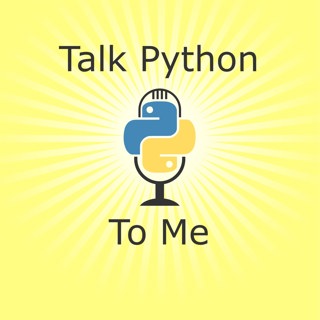
#291: Operational Resilience with Pyomo
Do you have a scientific system that needs optimization or solving? Our guest, on this episode, Clark Petri is here to tell us all about pyomo. This is a library that can solve all sorts of cool problems, linear programming, nonlinear equations, and many other things you can throw at it.
22 Marras 202059min

#290: Side Hustles for Data Scientists
Are you a data scientist looking to branch out on your own and start something new? Maybe you're just looking for a way to work with those exciting libraries that aren't yet in play at the day job. Rather than putting everything on the line, quitting your job, and hoping things work out, maybe you should start with a side-hustle.
13 Marras 20201h 8min

#289: Discovering exoplanets with Python
When I saw the headline "Machine learning algorithm confirms 50 new exoplanets in historic first" I knew the Python angle of this story had to be told! And that's how this episode was born. Join David Armstrong and Jev Gamper as they tell us how they use Python and machine learning to discover not 1, but 50 new exoplanets in pre-existing Keplar satellite data.
9 Marras 202047min

#288: 10 tips to move from Excel to Python
Excel is one of the most used and most empowering piece of software out there. But that doesn't make it a good fit for every data processing need. And when you outgrow Excel, a really good option for a next step is Python and the data science tech stack: Pandas, Jupyter, and friends.
31 Loka 20201h 3min

#287: Testing without dependencies, mocking in Python
We know our unit tests should be relatively independent from other parts of the system. For example, running a test shouldn't generally call a credit card possessing API and talk to a database when your goal is just to test the argument validation.
21 Loka 20201h 3min

#286: Python and ML at NASA Jet Propulsion Laboratory (JPL)
NASA's Jet Propulsion Laboratory (JPL)'s primary function is the construction and operation of planetary robotic spacecraft, though it also conducts Earth- orbit and astronomy missions. It is also responsible for operating NASA's Deep Space Network.
16 Loka 20201h 7min

#285: Dask as a Platform Service with Coiled
If you're into data science, you've probably heard about Dask. It's a package that feels like familiar APIs such as Numpy, Pandas, and Scikit-Learn. Yet it can scale that computation across CPU cores on your local machine all the way to distributed grid-based computing in large clusters.
9 Loka 20201h 11min

#284: Modern and fast APIs with FastAPI
As Python 3 has eclipsed the old constrains of Python 2 and web frameworks that adopted them, we have seen a big jump in new frameworks appearing on the scene taking full advantage of things like type hints, async and await, and more.
4 Loka 20201h 6min

